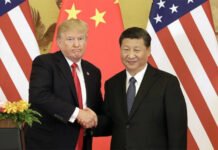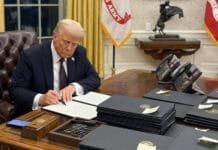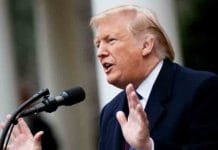INVC NEWS
Washington, DC – : A sweeping wave of changes under the Trump administration is gaining momentum as legal action, national security reforms, and a high-stakes steel industry deal dominate headlines. The Justice Department has filed a lawsuit against four key New Jersey cities, while President Donald Trump prepares to restructure the National Security Council and possibly approve the controversial US Steel-Nippon partnership. All these developments reflect Trump’s renewed strategy to tighten control, boost domestic industry, and confront opposition to federal immigration enforcement.
Justice Department Sues Four New Jersey Cities Over Sanctuary Policies
The Trump administration has intensified its stance against sanctuary jurisdictions, launching a federal lawsuit targeting four New Jersey cities — Newark, Jersey City, Paterson, and Hoboken. According to the Department of Justice, these cities implemented sanctuary policies that prohibit local law enforcement from cooperating with federal immigration officials, thereby obstructing federal immigration law.
Filed in a federal court in New Jersey, the lawsuit demands an immediate reversal of these policies. Administration officials argue that local authorities are “knowingly interfering with federal mandates” and compromising national safety. Sources close to the DOJ indicate that additional lawsuits may follow if other sanctuary cities continue similar practices.
Trump Administration Eyes Structural Overhaul of the National Security Council
President Trump has directed a strategic revamp of the National Security Council (NSC), signaling a significant shift in how security policy will be shaped and executed. The move comes just weeks after Trump replaced NSA Mike Waltz with Secretary of State Marco Rubio, consolidating power and creating a more streamlined command structure.
Under the proposed plan, several political appointees and expanded staff members will be reassigned to their respective departments, trimming the NSC to a core operational body. The administration believes that the NSC has become bloated and inefficient and is seeking to restore its original advisory purpose by removing politically appointed staffers who were embedded during the previous administration.
The reshuffle is also seen as a calculated effort by President Trump to centralize foreign and defense policy under his direct influence, with Rubio expected to play a pivotal role in both international diplomacy and homeland security coordination.
Trump Indicates Support for US Steel-Nippon Deal, Promising Massive Economic Boost
President Trump has publicly indicated his support for a multi-billion-dollar deal between US Steel and Japanese steelmaker Nippon Steel, reversing a decision made by former President Joe Biden to block the merger. Trump’s latest remarks suggest that the deal, worth approximately $15 billion, will proceed — but under conditions favorable to American economic interests.
During a press briefing on Friday, Trump stated that “US Steel will remain in Pittsburgh” and that any partnership with Nippon would be carefully structured to preserve American jobs and sovereignty. Following his comments, US Steel’s stock experienced a noticeable jump, reflecting investor confidence in Trump’s direction.
According to Trump, the strategic partnership is projected to generate 70,000 jobs and infuse $14 billion into the U.S. economy. Analysts expect the Trump administration to request that Nippon invest directly in US Steel operations rather than pursue a full acquisition, ensuring American control over the legacy manufacturer.
The deal remains under federal review, but Trump’s strong public statements indicate a likely path toward conditional approval. Industry leaders are watching closely, with labor unions, investors, and policymakers all weighing the implications.
Sanctuary Policy Dispute Intensifies Federal vs. Local Governance Battle
The lawsuit against the four New Jersey cities underscores the ongoing clash between federal immigration policy and local governance autonomy. Under sanctuary policies, cities refuse to honor detainer requests from Immigration and Customs Enforcement (ICE), often citing concerns over civil rights and community trust.
However, the Trump administration maintains that these policies “invite chaos and obstruct federal law enforcement.” The legal action may set a precedent, encouraging more states to reassess their sanctuary policies or face similar federal pushback.
Officials from the targeted cities have pushed back, accusing the administration of politicizing immigration and undermining states’ rights. Legal experts predict a prolonged court battle that could eventually reach the Supreme Court, especially if other states with sanctuary policies face similar lawsuits.
National Security Council Restructuring Signals Policy Consolidation
The decision to restructure the NSC comes as part of Trump’s broader plan to eliminate internal dissent and bureaucratic gridlock. By scaling down the council and eliminating surplus roles, the administration intends to focus on core national security objectives, including cyber defense, counterterrorism, and military readiness.
Bringing Marco Rubio into the role of NSA is a clear signal of trust and alignment on key policy fronts, particularly in dealing with foreign adversaries and shaping trade negotiations. The administration hopes this change will bring sharper coordination between the Pentagon, the State Department, and intelligence agencies.
Critics argue the reshuffle risks centralizing too much power in the hands of political allies, potentially marginalizing professional diplomats and career military advisers. Nonetheless, the move is already in motion and reflects Trump’s commitment to rapid and unfiltered decision-making at the highest level.
Trump’s Pro-Business Stance Echoes in Steel Deal Strategy
The US Steel-Nippon deal is shaping up to be one of the biggest test cases of Trump’s “America First” economic strategy. While Biden opposed foreign acquisitions of strategic assets, Trump appears willing to endorse international investment — as long as American control remains intact.
Trump’s remarks about the headquarters staying in Pittsburgh and the massive job creation forecast point toward a carefully engineered deal. Insiders suggest that the White House has been working behind the scenes with both companies to shape a framework that protects national interests while attracting foreign capital.
Industry analysts say that if the deal is approved under Trump’s terms, it could signal a new era of pro-business diplomacy, encouraging other foreign companies to strike similar investment deals with American firms — but only under conditions that safeguard U.S. jobs and infrastructure.
Federal Legal Action, Security Council Reform, and Steel Diplomacy Redefine Trump’s Agenda
Major developments are shaping President Trump’s strategic blueprint for governance: legal action against sanctuary cities, aggressive restructuring of national security operations, and a potential green light for one of the most influential corporate partnerships in years. Each of these decisions reinforces a central message — the administration intends to assert firm control over immigration, security, and economic policy going forward.
















